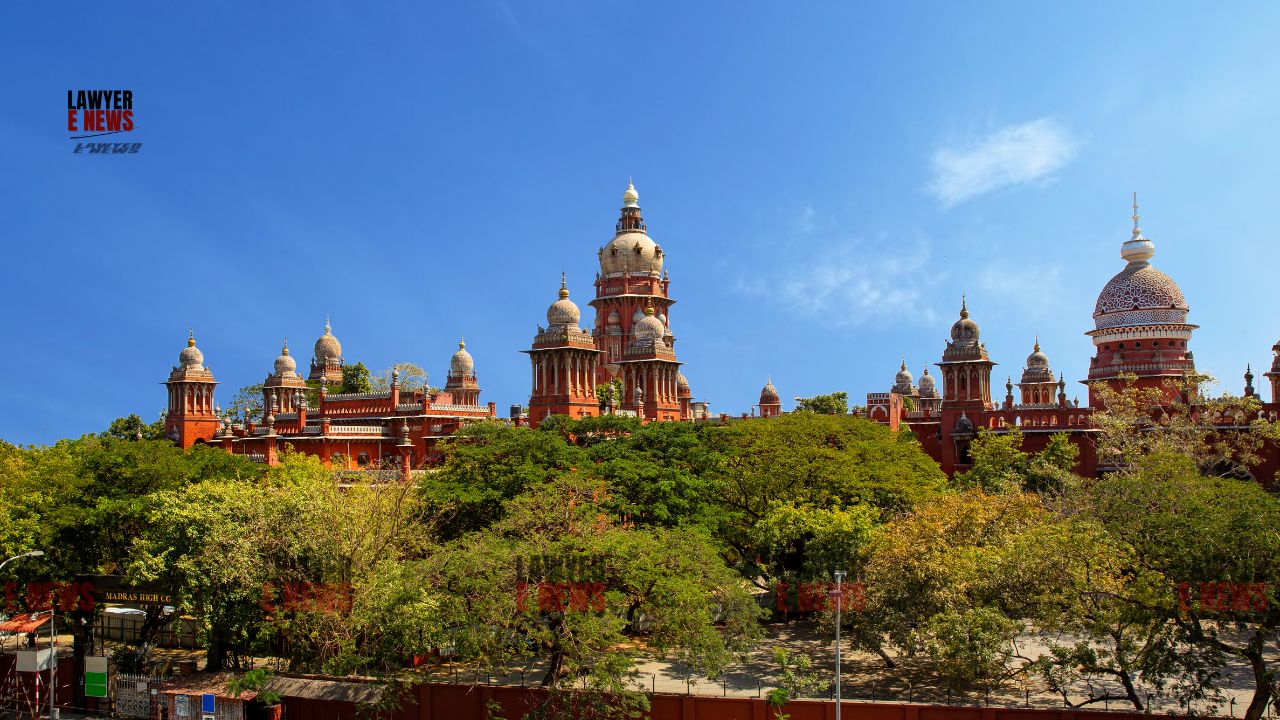-
by Admin
15 February 2026 5:35 AM



The Madras High Court, on September 4, 2024, dismissed a criminal revision petition seeking the discharge of two accused in a cheating case involving property transactions in Chennai. The bench, presided by Justice M. Nirmal Kumar, upheld the trial court’s order, emphasizing that there was sufficient prima facie evidence against the accused, and any disputed facts should be examined during the trial. The accused, B. Thiagarajan and S. Vijayalakshmi, were charged under Sections 406, 420, and 506(ii) of the Indian Penal Code (IPC), relating to criminal breach of trust, cheating, and criminal intimidation.
Facts of the Case: The case arose from a complaint by Parasmal H. Jain, who alleged that he and his family had purchased property at Ayya Mudali Street, Chennai, through an auction conducted by M/s. Alwin and Company in 2011. The agreed sale price was ₹1.20 crores, with ₹60 lakhs being paid for the property and an additional ₹60 lakhs for vacating the occupants of the property. Despite receiving the full payment, the accused failed to vacate the premises, leading to the filing of a criminal complaint in 2012. The case was later transferred to the Central Crime Branch (CCB), and a charge sheet was filed after investigation.
Nature of the Dispute: The accused contended that the issue was civil in nature, arising from a misunderstanding between the parties. They argued that the transaction involved a legitimate auction, and the payment made for vacating the property occupants was part of the civil agreement. The defense highlighted that the dispute also involved a pending civil suit (C.S. No. 227 of 2016), wherein the complainant had admitted possession of the property.
However, the court rejected this argument, stating, “The fact that a civil case is pending does not absolve the criminality involved in the present case.” The court observed that criminal proceedings can run concurrently with civil litigation, especially when there is evidence of fraudulent intent.
Allegations of Extortion: The petitioners further alleged that the police had colluded with the complainant, forcing the first petitioner to pay ₹28 lakhs at the police station. They claimed that this was part of a conspiracy to extort money. A separate case concerning these allegations was registered and is pending trial in C.C. No. 6 of 2016.
Despite this, the court noted that the extortion claim did not negate the petitioners’ liability in the present case. The court emphasized, “The criminality of the accused in this case must be examined based on the evidence presented, irrespective of any parallel extortion case.”
Prima Facie Evidence: The court carefully examined the prosecution’s evidence, including witness statements and documents. It noted that several witnesses (L.W.1 to L.W.19) corroborated the complainant’s version of events. Specifically, the court highlighted that occupants of the property (L.W.14 to L.W.19) vacated only after receiving payments from the complainant and not from the accused, as originally promised. The court observed, “The petitioners, after receiving ₹60 lakhs, took no steps to ensure the occupants vacated the property, which constitutes a clear breach of trust.”
Furthermore, the sale deed indicated that the property was sold in an “as-is-where-is” condition, which contradicted the accused’s claims of an agreement to vacate the premises.
Legal Reasoning: The court reiterated the legal principle that criminal proceedings cannot be quashed solely because there is an ongoing civil dispute. It cited the Supreme Court’s ruling in B. Suresh Yadav vs. Sharifa Bee (2007), which held that civil liability and criminal liability can coexist, and a criminal case can proceed if there is prima facie evidence of intent to deceive.
The judgment stated, “The contention that the matter is purely civil in nature cannot be accepted when there are sufficient materials indicating fraudulent conduct on the part of the petitioners.”
Conclusion: Dismissing the discharge petition, the court affirmed the trial court’s decision, holding that the petitioners had failed to make a case for discharge. “The facts as presented involve disputed issues that must be resolved at trial,” Justice M. Nirmal Kumar observed, emphasizing that the petitioners must face trial on the merits of the case.
This judgment underscores the court’s reluctance to interfere in ongoing criminal proceedings, particularly in cases where there is sufficient evidence to suggest criminal intent. The case will now proceed to trial, with significant implications for property-related disputes involving allegations of cheating and breach of trust.
Date of Decision: 04.09.2024
B. Thiagarajan & Anr. Vs. The State, Rep. by Inspector of Police, Central Crime Branch
